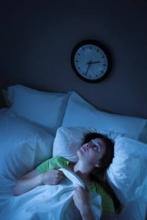Women who have systemic lupus erythematosus report greater sleep disturbance than did healthy women, with more than 75% of them experiencing poor sleep quality, according to a report published in the Egyptian Rheumatologist.
In a study of 30 Egyptian women with SLE and 30 healthy, age-matched women, the SLE patients had higher scores on the Pittsburgh Sleep Quality Index (PSQI), indicating clinical sleep impairment, said Dr. Hanan A. Kotb of the department of rheumatology and rehabilitation, Cairo University, and associates.
Yet despite the high frequency and clinical severity of their sleep problems, only 30% of the SLE patients reported using any sleep medication. This indicates that clinicians routinely underestimate sleep disturbance in this patient population, the investigators said.
Dr. Kotb and colleagues assessed sleep problems in these 60 study subjects using the PSQI, which measures seven sleep components: subjective sleep quality, sleep latency, sleep duration, habitual sleep efficiency, sleep disturbances, use of sleeping medication, and daytime dysfunction. The global score on this instrument ranges from 0 to 21 points, and a cutoff score of 6 or higher differentiates clinical sleep impairment with a sensitivity of 89.6% and a specificity of 86.5%.
The investigators assessed pain severity by using the visual analogue scale.
Among the SLE patients in this study, 13 (43%) had mild disease activity and 14 (47%) had moderate disease activity as measured by the Systemic Lupus Erythematosus Disease Activity Index (SLEDAI). The remaining three patients (10%) had severe disease activity.
All of the SLE patients were taking corticosteroids.
Compared with the control subjects, the SLE patients had significantly higher PSQI scores, indicating poorer sleep quality. The mean PSQI score was 8.47 among SLE patients, compared with 5.1 among healthy women.
In addition, the proportion of SLE patients who had high global PSQI scores was 77%, compared with only 30% of the control subjects, the researchers said (Egypt. Rheumatologist 2013;35:127-32 [doi: 10.1016/j.ejr.2013.02.003]).
The differences between the two study groups were significant for most of the seven individual sleep components measured. The single most prominent component of sleep disturbance in this study population was daytime dysfunction.
In a data analysis designed to identify which particular disease factors correlated with sleep problems, SLE activity, and duration, the degree of the patient’s functional disability, the severity of organ damage, pain severity, and depressed mood all were significantly associated with sleep disturbance.
However, in further refined analyses, only disease activity and scores on an index of organ damage were significant contributors to sleep disturbance.
In contrast, the use of corticosteroids, subject age, and subject education level showed no association with sleep problems.
These findings indicate that the routine management of SLE should include the assessment and management of sleep problems, Dr. Kotb and associates said.
The exact mechanism by which SLE impairs sleep is not yet known. "In autoimmune diseases, the elevated levels of proinflammatory cytokines may influence daytime sleepiness and disrupt nocturnal sleep. This pathway remains to be explored in SLE," they added.
No funding sources or financial conflicts of interest were reported.


